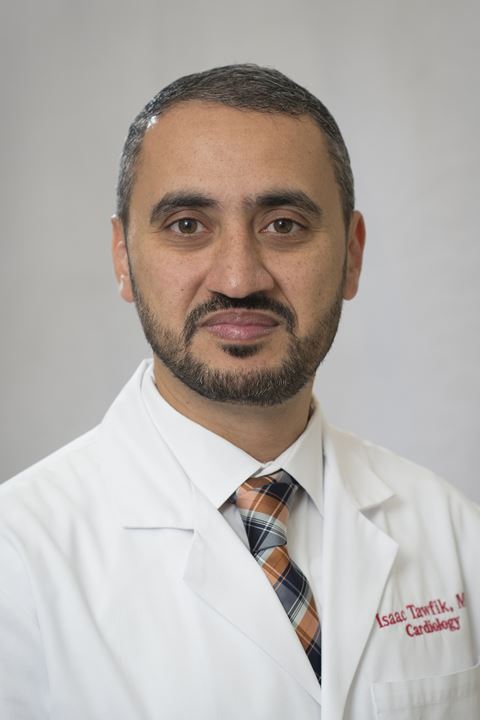
Monmouth Heart and Vascular offers coordinated care in one location.

MD, RPVI, FACS

“We wanted to build a collaborative environment where we work as colleagues,” says Isaac Tawfik, MD, Chief, Section of Cardiology, and Medical Director, Cardiac Catheterization Lab at MMC, Clinical Assistant Professor of Medicine, Rutgers Robert Wood Johnson Medical School, and a member of RWJBarnabas Health Medical Group. “That helps us practice better medicine and fosters the best possible outcomes for patients.”
Here are five key ways you can benefit from combined cardiovascular services.
Seamless Care
At Monmouth Heart and Vascular, you can see a cardiologist, get tests, see a vascular specialist and receive treatments at the same location instead of going to different places for each of those services.
“We’re a one-stop shop where everyone works together,” Dr. Shafritz says. “That’s more convenient for patients, expedites care and allows better communication between providers.” Tests often used for both cardiac and vascular care can easily be shared along with provider notes. “We consult each other for questions that may be better addressed by a physician from the other specialty while staying in close touch with our patients,” Dr. Tawfik says.
State-of-the-Art Tests
The practice offers comprehensive, noninvasive diagnostic testing including the latest, most advanced platform and software for ultrasound imaging, which provides color and reveals flow dynamics as blood courses through vessels.
Vascular tests can screen and monitor conditions such as abdominal aneurysm, endovascular repairs, peripheral artery disease and venous conditions such as varicose veins. “Many of our tests are highly specialized and not commonly available,” Dr. Shafritz says.
Advanced cardiology tests include nuclear stress tests and 3D echocardiography that can identify subtle changes in heart function. “One way this can be useful is indicating whether a chemotherapy agent is affecting the heart’s ability to contract,” Dr. Tawfik says. “That’s fueled development of a relatively new discipline called cardio-oncology where cardiologists and oncologists work in close collaboration to help certain cancer patients.”
The practice has also launched a program in which cardiac MRIs help evaluate the heart’s strength and answer crucial questions that can guide treatments. “Cardiac MRIs have also become an important way to identify an inflammation of the heart called myocarditis, which we’re seeing a lot of with COVID-19,” Dr. Tawfik says.
Specialized Technologists
Highly trained providers called registered vascular technologists (RVTs) conduct and evaluate tests with a high level of expertise right on-site. “We have multiple RVTs, and that’s important for obtaining high-quality studies,” Dr. Shafritz says.
Doing tests where doctors practice further enhances communication about care. “If technologists have questions, they can go straight to the physician, and we are often able to intervene while the study is being performed to obtain the data we’re looking for so the patient doesn’t waste time getting a test that may have little clinical value,” Dr. Tawfik says.
Comprehensive Treatments
Monmouth Heart and Vascular offers a wide variety of interventional cardiology and vascular treatments, including minimally invasive angioplasty and stenting, pacemaker implantation and cardiac ablation. Vascular treatments also include endovascular treatment for aneurysm and peripheral arterial disease, and a variety of treatments for venous conditions such as deep vein thrombosis and varicose veins, including phlebectomy, Varithena treatment and cosmetic sclerotherapy.
High-Level Expertise
“Many of our providers have subspecialty training even beyond their specialty training in cardiology or vascular medicine, such as electrophysiology for complete care of conditions like arrhythmia,” Dr. Tawfik says.
“With our expert care, advanced testing and state-of-the-art facilities, we can do many things at a community hospital level that you’ll find at a university medical center,” Dr. Shafritz says. “Our combination of services provides comprehensive, personalized care close to home.”
Do You Need Vascular Care?
You may be familiar with signs of heart disease such as chest pain or difficulty breathing with activity. But signs of vascular problems due to conditions such as diabetes are less well known. Consider seeing a vascular specialist if you experience key symptoms such as:
- Unexplained leg pain
- Pain with walking
- Ulcers or wounds on feet or ankles
- Recurrent infections
- Hair loss on legs
- Leg heaviness or swelling
- Visible varicose veins
Whoever your heart beats for, our hearts beat for you. To connect with a top cardiovascular specialist at Monmouth Medical Center, call 888-724-7123.